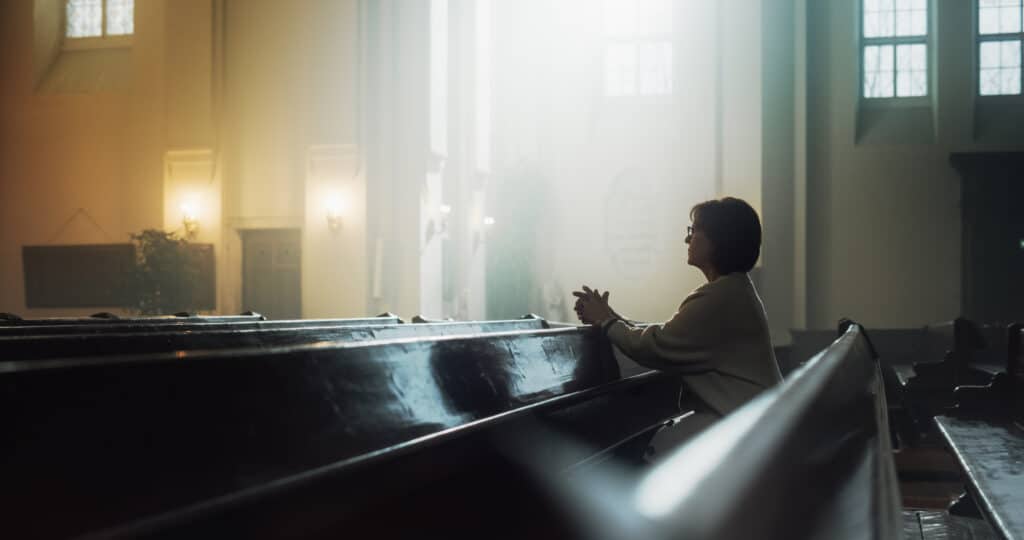
Mike Phillips
21 November 2023
I have an ongoing debate with my father, which I’m in danger of losing. Ten years ago, when I left maths teaching to train for Christian ministry, he was more than a little bemused, though not surprised. To him, I was joining a declining institution with a dim future. Unfortunately, recent data only reinforce his case.
I asked what he thought the median Sunday attendance was at Anglican churches in Melbourne and Geelong.
He thought for a moment or two … “Maybe 120?”
He’s a bit too optimistic. Even in 2001, the answer was 85.
Today, that number is 42.
Read more: We must nurture churches that look different from the traditional parish
This means half of the 200 or so Anglican parishes and authorised congregations in our diocese have 42 or fewer people meeting together on an average Sunday. Total average Sunday attendance for the diocese has declined from about 20,000 in 2005 to about 13,000 today. Both large and small churches are declining – the largest 10 per cent of parishes now have 26 per cent less people coming than in 2006*. No doubt COVID is part of this decline, but there must be deeper issues behind this long-term, widespread trend. Size is not the only measure of fruitfulness, and good ministry can happen in small churches, but this decline is deeply saddening, and we must not ignore it.
It’s a grief we all must share, whether we attend a large or a small church. It must spur us to action. Not to heap blame or shame on smaller churches. But to make courageous decisions about how we can best reach Melbourne and Geelong with the good news of Christ, through local gatherings of God’s people.
I realise that this is emotionally fraught. My grandparents joined their local Anglican church when it was planted in what was then a growth corridor more than 60 years ago. When we packed up their home a few years ago, I found the order of service from my aunt’s confirmation in the 1960s. Eighty names were listed to be confirmed that day! This year, their parish had fewer than 40 attendees on an average Sunday.
Read more: This isn’t ‘faddish irrelevance’, it’s vital to the church
Now in their late 90s, my grandparents still grieve their church’s decline. My grandmother was still attending the Bible study group well into her 80s. My grandfather did regular maintenance there for decades. They don’t want to see it merged with the parish three kilometres away, let alone closed and sold. But the plight facing their church is decades in the making. Humanly-speaking, it won’t be easily turned around. Given the pressures on our human and financial resources, would we be faithful to try? Could we better honour my grandparents’ faith and good works, to say nothing of honouring Christ, by planting in Officer or Donnybrook or Truganina instead, where people have to travel a lot more than three kilometres to get to an Anglican church?
Unless we face the reality, we cannot expect to see change. We will need faith and vision and much prayer. We will need to ask hard questions and be willing to change. Is it possible that we have sacrificed gospel vision for Melbourne for something else we value? I fear that, in the name of a certain kind of diversity, we’ve spent more effort propping up unfruitful churches and constraining fruitful ones, rather than pruning the unhealthy and allowing the healthy to flourish and multiply.
Read more: We have the money, now we need vision
This is a genuine challenge of leadership, for laity and for clergy, at the diocesan level and at the parish level. Without determined vision, sustained effort, and bold hope in God’s promises, we are simply managing decline.
Because no parish, no authorised congregation is forever. No diocese is forever. God’s church is forever, but our parishes are not. In God’s kindness, new churches are planted, and congregations grow. Sooner or later, though, they decline, and sometimes they need to close, with due thanksgiving for how they have served the Lord and their local community in their time.
Of course, Sunday gatherings are not the only measure of our ministry. This figure doesn’t take into account many other important things, like small group Bible studies, nursing home services, week-day services, youth groups, evangelism and outreach initiatives, pastoral visiting or playgroups. It doesn’t reflect sector ministry in schools or hospitals, prisons or the defence forces.
Read more: Growing a healthy church isn’t complex … but it is counter-cultural
But Sunday attendance remains a critically important measure of the health of our diocese. Sunday services are where God gathers his people to hear his word preached and to receive the sacraments of baptism and the Lord’s Supper duly administered. As we gather on Sunday, our hope is nourished for our future together, as Revelation 7 describes: a great multitude from many nations, gathering around the throne of the Lamb to sing his praises.
This future, God’s future, is not in doubt. It’s this vision that prompted me to bemuse my Dad and serve the Lord in Christian ministry. It’s this vision that sustains me in ministry. I hope and pray that God will continue to use Anglican churches to gather and prepare Melburnians for his future.
The Reverend Mike Phillips is campus minister at St Jude’s Anglican Church Parkville.
*These figures are calculated from parish self-reporting of average Sunday attendance, published in the yearbook for synod of the respective year (obvious errors have either been adjusted or excluded). This year’s data can be found on pages 121-126 of Part B of Synod 2023 reports.
For more faith news, follow The Melbourne Anglican on Facebook, Instagram, or subscribe to our weekly emails.






